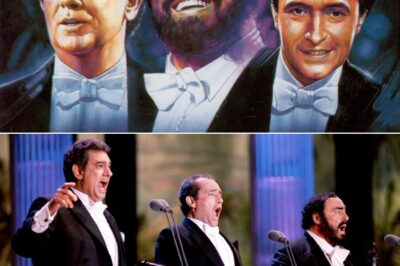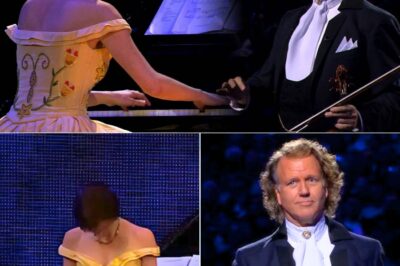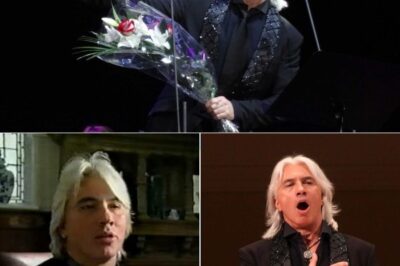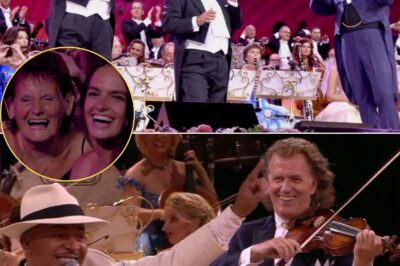You Won’t Believe How Jonas Kaufmann Transforms This One Aria into a Heart-Stopping Journey of Love and Despair — When You Hear E lucevan le stelle from Tosca, Performed Like This, It Will Stay with You Forever: One Voice, One Moment, and the Unforgettable Sound That Silences Everything Around You
Jonas Kaufmann’s E lucevan le stelle from Tosca is pure heartbreak set to music. His voice, drenched in longing and despair, paints a vivid portrait of love and loss. Every note lingers in the air, haunting and unforgettable. Simply magnificent.
Jonas Kaufmann’s E lucevan le stelle: Pure Heartbreak in Music
In the vast landscape of operatic performances, few moments possess the emotional depth and sheer magnetism of Jonas Kaufmann’s rendition of “E lucevan le stelle” from Puccini’s Tosca. This haunting aria, already one of the most poignant declarations of love and despair in the opera canon, becomes a transcendent experience in the hands—and voice—of Kaufmann. With every note, he invites listeners to step into a world where love is fragile, memory is torment, and death hovers just beyond the horizon.
A Moment of Stillness Amid Tragedy
“E lucevan le stelle” (“And the stars were shining”) occurs in Act III of Tosca, moments before the painter Mario Cavaradossi is to be executed. Imprisoned and abandoned, he reflects on the night he spent with his beloved Tosca, recalling the touch of her skin, the perfume of her hair, the sound of her voice. It is a lament, a cry to the heavens, a remembrance of beauty lost.
Jonas Kaufmann steps into this emotionally charged scene not merely as a singer but as a man who has known love and now stands on the edge of the abyss. His approach to this aria is not just about vocal excellence; it is about emotional surrender. He becomes Cavaradossi. His voice does not just sing the words—it bleeds them.
A Voice That Trembles with Emotion
Kaufmann’s voice, known for its smoky timbre and incredible dynamic control, finds a perfect vehicle in this aria. From the very first line, “E lucevan le stelle,” there is a sense of reverent stillness, as though even the orchestra dares not breathe too loudly. The words fall from his lips like petals, each one weighed down with memory and regret.
As the aria progresses, the tone darkens. His voice carries a rare balance of strength and vulnerability. When he sings “O dolci baci, o languide carezze” (“Oh sweet kisses, oh languorous caresses”), there is a longing so intense, so honest, that it threatens to overwhelm the listener. His breath control allows the phrases to linger, each note drawn out just long enough to make the heart ache. Kaufmann’s masterful phrasing ensures that nothing feels rushed or showy. Every pause, every swell in volume, every soft diminuendo serves the story.
His voice, drenched in longing and despair, becomes a vehicle through which the listener is transported directly into Cavaradossi’s final thoughts. The pain is palpable. The beauty is almost too much to bear.
Musical and Dramatic Intelligence
What sets Kaufmann apart from many great tenors is not just the quality of his voice but the intelligence behind every artistic choice. His “E lucevan le stelle” is not just a technical feat; it is a dramatic monologue, delivered with the nuance of a seasoned actor and the heart of a man fully immersed in the tragedy of the character.
He does not treat the aria as an isolated showpiece but integrates it into the emotional trajectory of the opera. As such, even without the full context of the performance, a listener can feel the weight of everything that has come before—and everything that is about to happen. The aria becomes more than music; it becomes testimony. It becomes farewell.
The Orchestra as a Silent Partner
Though Kaufmann is front and center, his performance is elevated by a subtle and sensitive orchestral accompaniment. Puccini’s lush orchestration, filled with soft strings and gentle winds, creates an atmosphere of dusk and quiet reminiscence. Under a conductor who understands the emotional weight of the aria, the orchestra never overshadows the tenor but gently cradles his voice, giving it the space to soar and weep.
The interaction between Kaufmann and the orchestra feels almost like a duet. There’s a deep connection between the rise and fall of the music and the emotional currents running through his voice. It’s as though the instruments themselves are mourning with him, echoing his despair with every minor chord and aching suspension.
A Universal Cry of the Human Spirit
Though rooted in the specific narrative of Tosca, “E lucevan le stelle” touches on emotions that are profoundly universal. It is about the anguish of parting, the torment of memory, and the unrelenting approach of fate. In Kaufmann’s voice, these themes are not abstract—they are raw, immediate, and deeply human.
Listeners who may not understand a word of Italian still find themselves moved to tears. This is the power of true artistry. Kaufmann’s interpretation crosses language and cultural barriers, reaching into the heart of anyone who has ever loved deeply or lost suddenly.
Critical Acclaim and Audience Adoration
It is no surprise that Kaufmann’s performance of this aria has been lauded by critics and adored by audiences worldwide. Many opera fans consider his interpretation definitive for our time. The balance he strikes between classical technique and emotional authenticity sets a new standard for how this piece can be performed.
Live performances often end with stunned silence followed by roaring ovations. Viewers online have described feeling “haunted for days” after hearing it, and some have called it “the closest thing to perfection in opera.” There is a collective understanding among those who witness it: this is not merely a performance—it is a revelation.
Legacy in the Making
Jonas Kaufmann is no stranger to acclaim, but it is performances like “E lucevan le stelle” that define a legacy. Decades from now, his version will be played and studied as a model of how a singer can elevate a moment from beautiful to unforgettable. Future tenors may bring their own gifts to the role of Cavaradossi, but Kaufmann’s haunting portrayal will always loom large as a benchmark of excellence.
For those lucky enough to witness it live, it becomes a once-in-a-lifetime memory. For others, recordings offer a small but powerful taste of the magic. Either way, the impact remains the same—one is changed after hearing it. Forever aware of how music can so precisely capture the human soul.
Conclusion: Simply Magnificent
In the end, Jonas Kaufmann’s “E lucevan le stelle” is not just a song—it is an experience. It is what happens when vocal prowess meets emotional truth, when music becomes more than notes on a page and turns into something living, breathing, and profoundly moving.
There are many performances of Tosca worth hearing, but few deliver the gut-wrenching heartbreak and soaring beauty that Kaufmann achieves in this aria. His voice, drenched in longing and despair, paints a vivid portrait of love and loss. Every note lingers, haunting and unforgettable. Simply magnificent.

Jonas Kaufmann’s E lucevan le stelle from Tosca is pure heartbreak set to music. With his dark, velvety tenor drenched in longing and despair, he paints a vivid portrait of love and loss, capturing the soul of Puccini’s tragic aria.

Every note lingers in the air, haunting and unforgettable. His phrasing is exquisite, each word weighted with sorrow, his dynamic control bringing out the aria’s aching vulnerability. As his voice swells with passion and fades into resigned hopelessness, the listener is drawn into the depths of Cavaradossi’s final moments.

Simply magnificent—an interpretation that transcends mere performance, leaving an indelible mark on the heart.
News
When José Carreras stepped onto the stage to perform Torna a Surriento in honor of Mario Lanza, no one expected what would unfold next—his voice didn’t just fill the room; it seemed to reach back through time, echoing with the passion and brilliance of a forgotten era. The atmosphere shifted, the audience fell silent, and some even questioned if they were witnessing more than just a performance. Was this truly Carreras, or had the very soul of Neapolitan music been awakened through him? What mysterious force stirred that night? Why did this single performance leave even seasoned opera lovers speechless? One thing was certain: something unforgettable happened—and it may never happen again.
When José Carreras performed Torna a Surriento in his tribute to Mario Lanza, it was as if the spirit of…
“There’s a Musical Performance Everyone Keeps Talking About, and It’s Not What You Expect—André Rieu’s Rendition of ‘Ballade Pour Adeline’ Has Left Millions Puzzled, Captivated, and Compelled to Rewatch Without Understanding Why—Some Call It a Perfect Mystery in Sound, Others Say It’s Just a Simple Tune, Yet It Continues to Spread Globally with Unexplainable Force—What Is It About This Instrumental That Pulls People In So Deeply? Why Are Listeners Around the World Experiencing Something They Can’t Explain Whenever This Version Plays? One Thing Is Certain: Whether You’ve Heard It Before or Not, There’s Something Hidden in This Performance That Might Change How You Experience Music Forever.
“There’s a Musical Performance Everyone Keeps Talking About, and It’s Not What You Expect—André Rieu’s Rendition of ‘Ballade Pour Adeline’…
You’ve Heard the Voice… But Do You Know the Man Behind It? From Frozen Beginnings in Siberia to Standing Ovations Across the Globe, Dmitri Hvorostovsky Uncovers the Untold Chapters of His Rise to Fame—A Journey Marked by Unimaginable Highs, Quiet Struggles, and Personal Discoveries Never Shared Until Now in This Rare and Candid Sit-Down with Bing & Dennis That Will Leave You Reexamining Everything You Thought You Knew About the World’s Most Captivating Baritone
You’ve Heard the Voice… But Do You Know the Man Behind It? From Frozen Beginnings in Siberia to Standing Ovations…
The moment classical music hijacked a disco legend—watch as Rieu’s strings unleash a tidal wave of joy, turning solemn concert halls into dancing riots. This isn’t just crossover; it’s a revolution where bow meets bassline, and the audience loses all restraint. Proof that even the grandest stages can’t contain the explosive power of a timeless anthem reborn.
The moment classical music hijacked a disco legend—watch as Rieu’s strings unleash a tidal wave of joy, turning solemn concert…
The Note That Shattered Eternity: Pavarotti’s Forbidden Rise from Obscurity to Opera’s Unrivaled Throne—A Documentary That Uncovers the Raw Truth Behind the Legend. How One Man’s Voice Defied Gravity, Broke Every Rule, and Rewrote Music History. Secrets, Scandals, and the Untold Sacrifices That Built an Icon. This Isn’t Just a Film—It’s a Revelation That Will Leave You Breathless. Witness the Explosive Journey of the Century, Where Talent Collided with Destiny, and the World Still Hasn’t Recovered. For Fans Who Think They Know Everything and Newcomers Who Dare to Discover: Prepare for the Unthinkable.
The Note That Shattered Eternity: Pavarotti’s Forbidden Rise from Obscurity to Opera’s Unrivaled Throne—A Documentary That Uncovers the Raw Truth…
Andrea Bocelli and Veronica Berti’s Breathtaking Duet: A Romantic Symphony of Love, Dance, and Passion That Captivated the World – Their Eyes Locked, Voices Merged, and Hearts Spoke in a Moment So Pure, It Felt Like Time Stood Still. Witness the Magic of Their Unbreakable Bond, the Grace of Their Waltz, and the Fire of Their Final Kiss That Left Millions Spellbound. This Isn’t Just a Performance—It’s a Love Letter Set to Music, a Testament to Devotion That Redefines Fairytale Romance. Every Glance, Every Note, Every Step Tells a Story of Two Souls Perfectly in Sync. Prepare to Be Moved Beyond Words!
Andrea Bocelli and Veronica Berti’s Breathtaking Duet: A Romantic Symphony of Love, Dance, and Passion That Captivated the World –…
End of content
No more pages to load


















